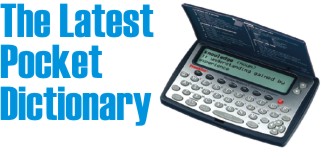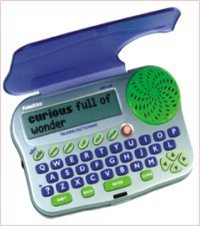Feature

Kazi Ahsan
 MODERN life has brought with it many conveniences TV, computers, mobile phones what not but it has also made our existence hectic forcing us to cut down on the time spent on each activity. Thus whatever we do has to be done more efficiently and quickly. Something as basic as learning how to read and write has undergone a metamorphosis to match with the times. In the old day, for instance, the fat, heavy, dictionary was an essential component for diligent readers who wanted to make sure that they knew the meaning of every word they read. It was useful to enhance one's own knowledge, more importantly; it helped a great deal to do well in standardized tests! While the big fat Thesaurus or Oxford or Webster has greatly reduced in size and weight, there still seems to be much room for improvement. MODERN life has brought with it many conveniences TV, computers, mobile phones what not but it has also made our existence hectic forcing us to cut down on the time spent on each activity. Thus whatever we do has to be done more efficiently and quickly. Something as basic as learning how to read and write has undergone a metamorphosis to match with the times. In the old day, for instance, the fat, heavy, dictionary was an essential component for diligent readers who wanted to make sure that they knew the meaning of every word they read. It was useful to enhance one's own knowledge, more importantly; it helped a great deal to do well in standardized tests! While the big fat Thesaurus or Oxford or Webster has greatly reduced in size and weight, there still seems to be much room for improvement.
This is where the digital, hand-held dictionary comes in. apart from the convenience of a slim, swanky-looking device that fits neatly in one's pocket (or bag) and goes anywhere one takes it to, the multiple features it offers makes it rather hard not to be seduced into becoming a bit of a know-it-all nerd. What could be more satisfying than to have on the palm of one's hand, a treasure of a few hundred thousand words, with their meanings, antonyms, synonyms, correct usage etc.? Yes yes, Game Boys are more fun as are fancy, multi-functioned cell phones, but a proper dictionary disguised in a digital garb and with all the instant functions one would expect of an electronic device of this age, now that is something of a novelty.
Franklin Electronic Publishers, Inc. a twenty year old American company has been specialising in just this innovative electronic language learning solutions on handheld devices. In 1986, the company marketed its first handheld reference device, the Spelling Ace, spell corrector which proved to be a big hit. Today the company has a huge range of handhelds, used world-wide by educators and in many cases are part of the curricula and lesson plans. In 2005, Franklin launched a new handheld platform -- "Pocket Prep™ for the NEW SAT"-- with content provided by The Princeton Review. This launch marked the Company's initiative to enter the handheld electronic standardized test preparation market which includes college prep, graduate school, and language proficiency testing.
The company also specialises in devices that help people to learn new languages with talking dictionaries that give the correct pronunciation of the words being searched.
Some people like to have everything in one place, especially when it comes to studying for the SAT as well as doing assignments, catching up on reading and also impressing members of the opposite sex by acquiring a stock-pile of new, suave words. The three-books-in-one device, has good old Thesaurus, Merriam Webster Dictionary which has 2,74,000 word meaning and SAT word list, plus other pleasing features: phonetic spell correction (which will tell you that phoren is spelt 'f-o-r-e-i-g-n'); 500,000 synonyms and antonyms; and most importantly, crossword solver and word games (learning must be fun right?). The latest Spelling Ace and Thesaurus even has a 'confusables' functions that helps you to differentiate between words that sound alike but mean totally different : 'affect' and 'effect' for example.
Perhaps the most popular of these handhelds will be the talking dictionary for kids. Besides the phonetic spell correction feature, this device speaks letters, words and definitions out loud for over 44,000 words! It also has fun stuff rhyme finders, Hangman, Jumble and Flashcards. And if you think the kid needs to know how to write the words she learns, the device also has a handwriting guide that shows children how to form letters and words in print and cursive on the screen.
As the need for convenient learning tools that take little space and can be taken everywhere (like a painfully boring seminar or dinner your parents dragged you to), the handheld electronic learning device will become more and more relevant. Its fast, instant access and multiple uses may well be a better option for many, than the time-consuming, tedium of a heavy paper dictionary.
|
